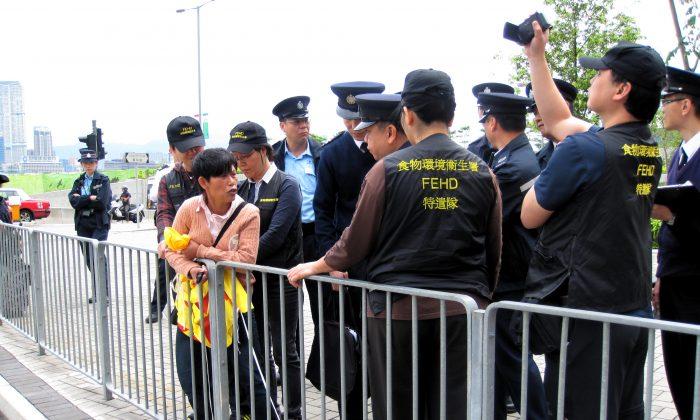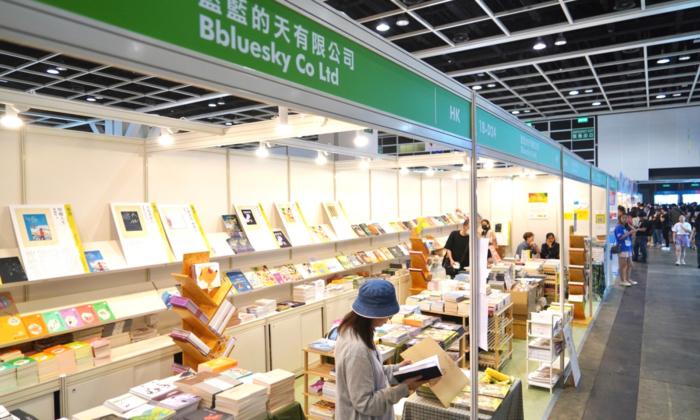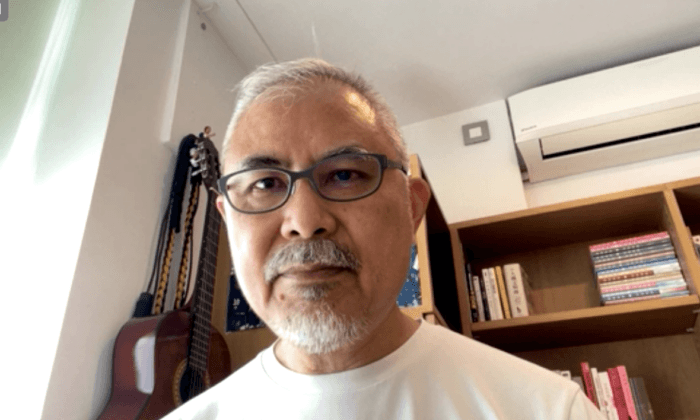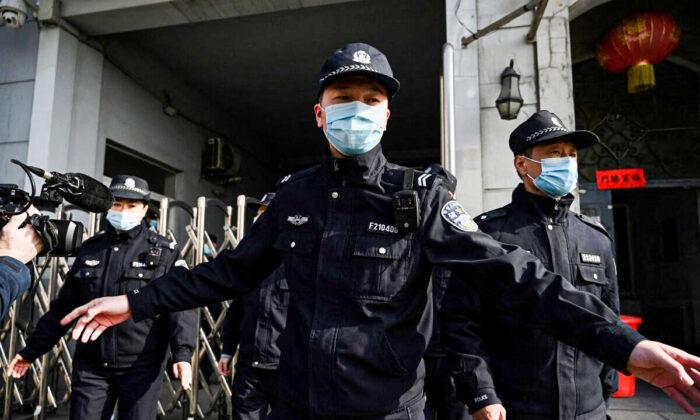HONG KONG—On May 2 a new line was crossed in the Hong Kong government’s recent attempts to shut down protests by Falun Gong practitioners, when a 56-year-old housewife was detained after she refused a police order to surrender a banner she had displayed outside the Central Government Complex. The detention followed a direct warning given to the practitioner by Hong Kong’s chief executive.
Ms. Pan Lianhua and another practitioner have displayed banners, passed out leaflets, and performed Falun Gong’s meditative exercises outside the government building that houses the office of Hong Kong’s chief executive since mid-October 2012, every Monday through Friday, from 8 a.m. to 2 p.m. On the morning of May 2, Ms. Pan was manning the location alone, with four banners displayed on a fence beside the street.
According to Ms. Pan, six members of the Hong Kong Food and Environmental Hygiene Department approached her and began removing the banners. Ms. Pan tried to stop them from taking the banners while explaining that she had a legal right to protest.
After the agents succeeded in taking down three of the four banners, Ms. Pan grabbed the last one and refused to relinquish it. The agents then called police. Ms. Pan was in a stand off with the crowd of Food and Environmental Hygiene agents and policemen for approximately 40 minutes.
Finally, Ms. Pan was escorted with some resistance to a police car and taken to the Central District Police Station in Sheung Wan. She had to submit to questioning and then paid HK$1,000 (US$129) to be released. Ms. Pan was not charged, but must report to the police at the end of May to find out whether there will be a hearing.
The scene outside the government building followed a conversation Ms. Pan had with chief executive Leung Chun-ying on April 30.
According to Ms. Pan, she had attempted to deliver a petition letter to the chief executive asking that the Hong Kong government stop confiscating the materials of Falun Gong practitioners.
On Tuesday mornings Leung regularly goes to the courtyard outside the government building where he will speak to constituents and receive letters through a security fence.
When Ms. Pan attempted to pass her letter to him, Leung told her not to put up banners outside his office any longer, and said if she would stop doing that, he would accept her letter.
Ms. Pan tried to tell Leung about how the Chinese Communist Party persecutes Falun Gong practitioners in the mainland. Leung then warned Pan not to put up banners outside his office any longer, repeated that if she stopped, he would accept her letter, and walked away.
On the same morning that agents of the Food and Environmental Hygiene Department removed Ms. Pan’s banners, they also confiscated banners and other materials from Falun Gong practitioners at several sites in Hong Kong.
This round of raids is the latest action in a campaign launched on April 12 by the Hong Kong government to shut down Falun Gong information sites.
The events outside the Hong Kong government building on May 2, however, marked a new stage in this campaign: the government had not previously detained any practitioners.
Since 1999, after the persecution of Falun Gong began in China’s mainland, Hong Kong Falun Gong practitioners have maintained sites at which they display banners and provide materials that tell the public about what Falun Gong is and how it is persecuted. Often it is possible at these sites to formally renounce all association with the Chinese Communist Party, an action called “tuidang” in Chinese.
These sites have been a sore point for CCP officials. Hong Kong is a popular destination for mainland tourists—15 million came in the first six months of 2012, according to the South China Morning Post. And the mainland tourists, who have been steeped in virulent propaganda attacking Falun Gong, are often interested in the information provided at these sites, and in withdrawing from the Party.
Once before, in 2004, the Hong Kong government tried to arrest Falun Gong practitioners for protesting, but the Hong Kong Court of Final Appeal affirmed the practitioners’ right to protest.
The recent actions by the Hong Kong government follow hard upon a ten-month long effort by a group called the Hong Kong Youth Care Association, Ltd., to obscure the Falun Gong sites with banners whose slogans were drawn from Communist Party propaganda vilifying Falun Gong, blanket the city with the same banners, and otherwise disrupt the Falun Gong practitioners protests, sometimes with physical abuse.
Hong Kong media discovered that the Youth Care Association has close ties with the Communist Party organ tasked with eradicating Falun Gong.
On April 1, the government forced the Youth Care Association to take down its banners.
Democratic dissidents and some members of Hong Kong’s Legislative Council have said that the government’s long toleration of the Youth Care Association’s actions and the recent efforts by the government to shut down Falun Gong information sites are both inspired by the CCP.
In a recent interview, Legislative Council member Albert Ho Chun-yan said, “Our government is under pressure from the CCP,” Ho said. “It has taken some actions against dissident groups, and it is clear that they are targeting Falun Gong.”
Corrections: Hong Kong chief executive Leung Chun-ying spoke with Ms. Pan Lianhua through a security fence in a courtyard outside the government building. Ms. Pan, when arrested was taken to Central District Police Station in Sheung Wan. The Epoch Times regrets the errors.




